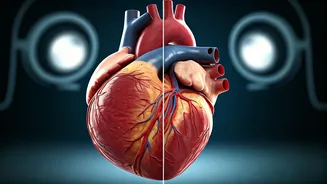Cholesterol: The Basics
Cholesterol, a waxy, fat-like substance, is vital for several bodily functions, including cell structure and hormone production. However, not all cholesterol
is created equal. The type of cholesterol significantly impacts your health, and understanding this distinction is key to heart health. The liver produces cholesterol, and it's also obtained through foods. When we talk about cholesterol, we generally refer to two main types: low-density lipoprotein (LDL) cholesterol and high-density lipoprotein (HDL) cholesterol. LDL is often termed “bad” cholesterol because high levels can build up in arteries, forming plaque and potentially leading to heart disease. HDL, on the other hand, is considered “good” cholesterol because it helps remove LDL cholesterol from the arteries, reducing the risk of heart problems. Keeping a healthy balance of these cholesterol types is essential for maintaining a healthy cardiovascular system and can be achieved through diet, exercise, and sometimes medication, under medical guidance.
LDL: The 'Bad' Actor
Low-density lipoprotein (LDL) cholesterol earns its 'bad' reputation because of its tendency to contribute to plaque buildup in the arteries. LDL cholesterol transports cholesterol particles throughout the body, and when LDL levels are elevated, these particles can accumulate in the artery walls, forming plaque. Over time, this plaque hardens and narrows the arteries, a condition known as atherosclerosis. This narrowing restricts blood flow, increasing the risk of heart attack, stroke, and other cardiovascular diseases. Factors contributing to high LDL cholesterol levels include a diet high in saturated and trans fats, a sedentary lifestyle, and genetic predispositions. Regular monitoring of LDL levels through blood tests is essential for assessing heart health, and your healthcare provider can help determine the appropriate course of action based on your individual risk factors. Management strategies often involve dietary changes, increased physical activity, and, in some cases, medication to lower LDL levels and reduce the risk of cardiovascular events.
HDL: The 'Good' Defender
High-density lipoprotein (HDL) cholesterol is often referred to as 'good' cholesterol due to its protective role in heart health. HDL works by removing LDL cholesterol from the arteries, transporting it back to the liver to be processed and eliminated from the body. This process helps prevent plaque buildup and reduces the risk of atherosclerosis. High levels of HDL cholesterol are associated with a lower risk of heart disease. Several lifestyle factors can help increase HDL levels. Regular physical activity is one of the most effective ways to boost HDL, as exercise helps the body to produce and maintain higher HDL levels. A diet rich in healthy fats, such as those found in olive oil, avocados, and nuts, can also help increase HDL. Additionally, quitting smoking and maintaining a healthy weight contribute to higher HDL levels and overall cardiovascular health. Regular blood tests to measure HDL cholesterol levels are an important part of heart health monitoring.
Daily Heart-Healthy Habits
Implementing simple daily habits can significantly protect heart health and help maintain healthy cholesterol levels. These habits often involve dietary adjustments, increased physical activity, and stress management techniques. A balanced diet plays a crucial role. This includes limiting saturated and trans fats, which can raise LDL cholesterol, and incorporating plenty of fruits, vegetables, and whole grains. Regular physical activity, such as brisk walking, running, or swimming, for at least 30 minutes most days of the week, can improve both HDL and overall cardiovascular health. Managing stress through techniques like yoga, meditation, or deep breathing exercises is also beneficial. Adequate sleep is vital, as sleep deprivation can affect cholesterol levels and cardiovascular health. Staying hydrated and avoiding excessive alcohol consumption are also important for maintaining a healthy heart. These small, consistent changes, implemented as part of your daily routine, can lead to substantial improvements in heart health and cholesterol management.
When Lifestyle Isn't Enough
Despite adopting healthy lifestyle changes, some individuals may still have elevated cholesterol levels. In such cases, medical intervention may be necessary. Genetics play a significant role, as some people are predisposed to higher cholesterol levels regardless of their diet and exercise habits. Family history of heart disease can also increase the risk. Certain medical conditions, such as hypothyroidism and diabetes, can also impact cholesterol levels. In these situations, your healthcare provider may prescribe medications to help lower LDL cholesterol and raise HDL cholesterol. Statins are one of the most common types of medication used to lower LDL cholesterol. Other medications may be used depending on individual needs and health conditions. Regular check-ups with your doctor are crucial to monitor cholesterol levels and determine the best course of treatment. Adhering to the prescribed medication regimen and continuing with healthy lifestyle habits are essential for optimal heart health.
Genetics vs. Diet
The debate over the relative importance of genetics versus diet in cholesterol management often arises. While diet significantly influences cholesterol levels, genetic factors can also have a substantial impact. Some individuals are genetically predisposed to higher LDL cholesterol levels, making it more challenging to manage their cholesterol through diet and exercise alone. Family history is a significant indicator. For these individuals, a heart-healthy diet, regular physical activity, and medication may be necessary to achieve and maintain healthy cholesterol levels. For others, diet and lifestyle changes alone can be sufficient to manage their cholesterol. The effectiveness of dietary interventions varies from person to person, underscoring the importance of personalized approaches to cholesterol management. Consulting with a healthcare provider to understand your individual risk factors and determine the best course of action is crucial, whether genetic factors or dietary considerations take precedence.














